Despite being introduced onto the market only about two years ago, the development of the Micro 4/3 standard up to now has not left anyone questioning this viable concept, perfectly filling in the gap in the market of photography equipment. In our reviews, we have already introduced the first Pen mode from Olympus – E-P1; now, let us look at the newest Pen, the E-PL1.
Due to the fact that the new Pen was given a very similar name as one of the first models in the product line, a comparison is in order. However, before going on to the review itself, it needs to be said that although the Pen E-PL1 represents a cheaper alternative to the previous models E-P1 and E-P2, it offers several new features and functions the first models lacked.
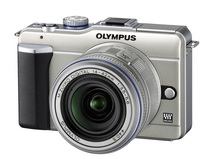 |
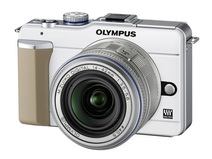 |
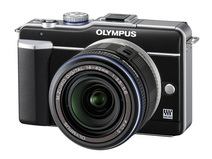 |
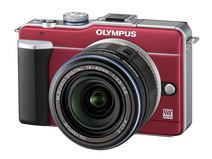 |
| Photo Olympus | |
Looking at the camera, it is clearly evident that the Pen has gone through an image change over, abandoning the retro look, a typical characteristic for the previous Pen models. The structure of the camera is dominated by plastic and the front side is slightly touched by a metal coating. The Pen E-PL1 is offered in 4 colors: black, white, red and champagne. The body itself is shorter as opposed to the previous models and thanks to the dominance of plastic, it’s an ounce and a half lighter. In addition, it has a slightly raised grip on the right camera front, allowing for a better hold of the camera.
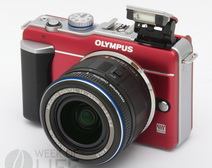 |
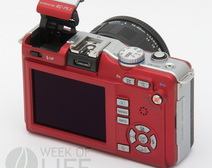 |
The back of the E-PL1 has a slightly smaller display than the original models (2.7 inches compared to 3 inches of the Pen E-P1 and E-P2) and completely lacks a command dial and a ring around the four-way direction pad. However, you can find new features such as a separate shutter button for recording videos or as it was the case with Pen E-P2, a connector for a VF-2 electronic viewfinder on the rear side below the flash hot shoe or an adapter for an external stereo microphone.
An important new feature is a small built-in flash with a GN of 7 – a missing feature of the previous Pen E-P1 and E-P2. The output of the flash is naturally very low and will more or less serve as a temporary tool along with high ISO sensitivity, nevertheless has one compelling feature – allows for wireless control of the external system Olympus flashes FL-50R or FL-36R.
 |
||||||||
|
||||||||
Olympus Pen E-PL1 utilizes the same sensor as cameras of the same brand, the stabilized 12Mpx Live MOS sensor with ultrasonic dust-reduction system. Its functional accessories are also more or less the same. There are three main exceptions worth mentioning: the shutter speed is limited at 2000 s (compared to 1/4000 s of the Pen E-P1 and E-P2), the ISO sensitivity ends at 3 200 (compared to ISO 6400) and image stabilization is less effective by 1 EV (3 EV compared to 4 EV).
What the previous two Pens are also lacking is the intuitive control system in the iAUTO mode. You don’t adjust the shutter itself, but you can use such features as the directional blur effect. Similarly, you can adjust the shutter speed to create freeze or blur motion effects or compensate for exposure. This mode also features a Tips section helping users compose shots of children, animals, flowers, food etc.
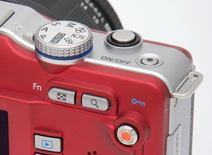 |
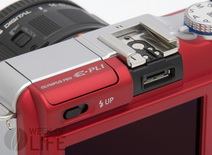 |
Despite the back side missing a control dial and the ring around the four-way direction pad – as already mentioned – the controls are still user-friendly and intuitive, as it is the case with other cameras of the same category. By pressing the top button of the four-way direction pad you can access the shutter settings, adjust the shutter speed or exposure compensation. The Ok button then opens a quick menu with the main parameters or you have the option to activate controls through the so called Super Control Panel (see screen preview). The main menu is well arranged and logically divided into sections. The camera has a wide range of custom settings, allowing for such special features as exposure fine-tuning (permanent correction of exposure modes individually).
|
Screenshots of the menu of Olympus Pen E-PL1
 |
 |
 |
 |
Overall evaluation
With its newest model E-PL1, Olympus created a cost-effective alternative of the Pen, but in reality, it has rather upgraded this product line. The camera includes a connector for an external electronic viewfinder or a stereo microphone, as well as built-in pop-up flash, allowing for a wireless control of efficient system flashes of the same brand. Image quality of the Pen E-PL1 is first rate, its intelligent features and new functions likewise. It is simply a perfect choice in between cameras of the same class.
Common Price (at the time of this review being published): $523.95 (body only), $584.89 (kit including 14–42 mm lens)
Basic Technical Data for Olympus Pen E-PL1
Sensor
Live MOS 17,3 × 13 mm
12 Mpx (4 032 × 3 024 px)
Light sensitivity ISO 100 to 3 200
Image stabilization
Optics
Based on lens
Memory medium
SD, SDHC
Data formats
Image: JPEG, RAW (ORF)
Video: AVI
Video
1 280 × 720 px, 30 fps
640 × 480 px, 30 fps
Mono sound (external stereo microphone)
LCD
Screen size 2,7“
230 000 px
Power supply
Li-Ion battery
Dimensions and weight (body only)
4.52“ × 2.9“ × 1.65“ inches (w × h × d)
12 oz. (incl. battery and memory card)
 |
 |
 |
 |
 |
 |
 |
 |
 |
 |
